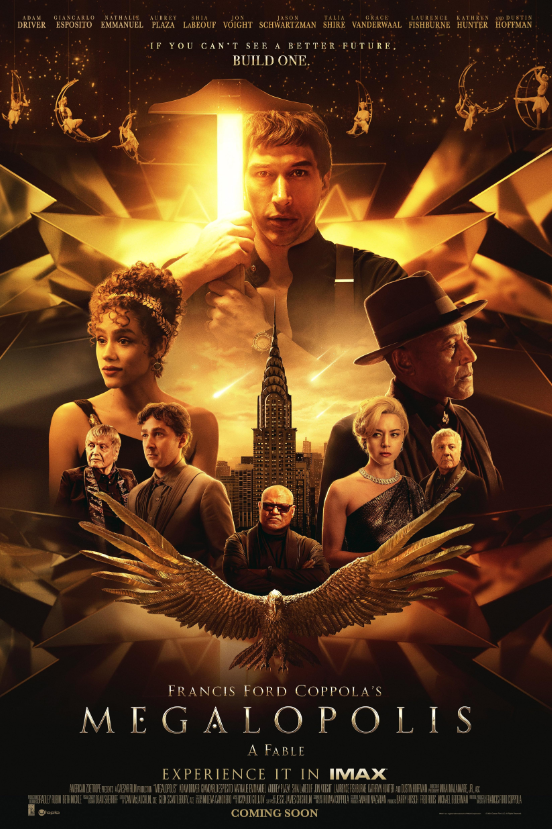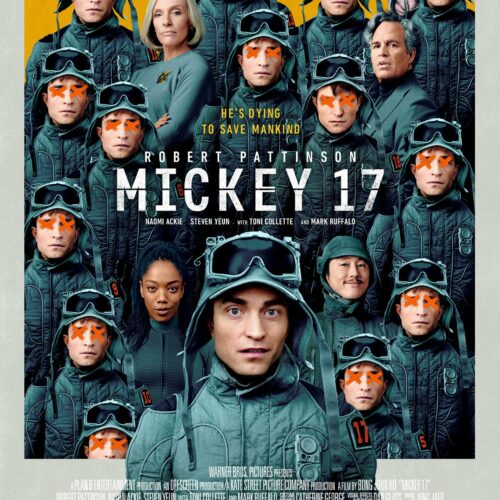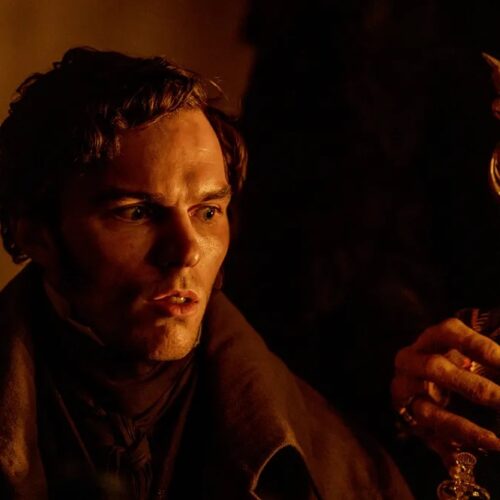
Reeder’s Movie Reviews: Megalopolis

“How would you like to watch a story where nothing ever happens? In my films, everything happens.”
In Federico Fellini’s utterly fascinating 1963 picture, 8½ , the film director character Guido Anselmi (played to perfection by Marcello Mastroianni) responds to the critic Daumier’s insistence that there are “so many superfluous things in the world already.” Yet Guido is desperately seeking authenticity in an inherently artificial medium: cinema.
For his new passion project, Megalopolis, Francis Ford Coppola has certainly demonstrated courage and perseverance, investing 120-million dollars of his own wine estate money in a production four decades in the making. Despite 300 rewrites (a number supplied by the director himself), this movie could have benefitted from even more. Alas, “everything” does happen here, but with minimal effect, dramatically and emotionally.
The famous auteur of such classics as The Conversation, Apocalypse Now (at least its uncut version) and The Godfather trilogy has conceived an immensely ambitious and visually eclectic work. It has operatic aspirations, coupled with a deeply personal message about hope for the future, borne of the “genius” of humanity. However, it lacks discipline and imagination in the writing, directing and editing, and the actors–an impressive roster of talent–wrestle with dialogue ranging from the pompous to the mundane to the unintentionally laughable.
Coppola’s tale–he calls it a “fable”–introduces New Rome, a bustling metropolis that looks much like New York, replete with images of the Statue of Liberty, Empire State Building and Madison Square Garden. It’s designed to compare present-day America to that ancient empire, and it’s the grandest of many painfully obvious symbols populating the film.
The basic conflict involves Cesar Catalina (Adam Driver), a progressive, playboy architect pursuing a miraculous invention called “Megalon,” described as a self-sustaining material destined to improve the human condition; Frank Cicero (Giancarlo Esposito), the conservative, money- and power-hungry mayor; and Hamilton Crassus (Jon Voight), Cesar’s uncle and an important financial patron of his utopian initiatives. Their very names speak volumes.
We also meet Wow Platinum (Aubrey Plaza), Crassus’ deeply cynical financial reporter-girlfriend, who has her sights set on reuniting with Cesar, while Crassus’ son Clodio (Shia LaBeouf) spends his time partying, inciting civil unrest, and posing in front of American flags. The mayor’s daughter, Julia (Nathalie Emmanuel), casually falls in love with Cesar after witnessing his ability to stop time. Yes, you read that correctly. When art is good, he explains, it resembles time stopping.
Whether you find yourself capable of embracing the movie or not, you have to admire the 85-year-old Coppola’s go-for-it mentality here. Between the convoluted plot and the opulent visuals, you can recognize the influence of Fritz Lang (Metropolis), Stanley Kubrick (Dr. Strangelove), The Wachowskis (The Matrix and Cloud Atlas), George Lucas (Star Wars), Lars von Trier (Melancholia) and Fellini (Roma and Satyricon). Male characters wear toga-like garments; the women often wear flowing gowns. Cesar’s departed wife, Sunny Hope, haunts and inspires him. A Britney Spears-like character named Vesta Sweetwater appears, only to be undone by a deep-fake sex tape. American society descends into monochrome filth, as a Soviet era spacecraft hurtles toward the Earth. So many potential ideas. So many tangents. So many meaningless subplots. So little cohesion.
The actors’ line readings are just as undisciplined as the storytelling. Sometimes they speak in lofty tones, quoting Marcus Aurelius and William Shakespeare (including Hamlet’s most famous soliloquy). At other points, they speak in modern, derisive slang or in inflection-free outbursts. The eminent Dustin Hoffman, who plays Nush “The Fixer” Berman, fares very badly in that regard. Coppola veteran Laurence Fishburne, as Cesar’s driver and the film’s narrator, hardly registers.
Mind you, Coppola does demonstrate vision here–vision, as in the opulent look of the film, with its rich color palette, architectural shapes, and wide array of special and stylistic effects. Cinematographer Mihai Malaimare, Jr. (The Master, Jojo Rabbit) bravely tries to match the director’s intentions. Unfortunately, his strong work often emphasizes the lack of rhythm and unfocused script, with many scenes choppily edited and almost discarded.
As for the music, high marks go to Argentinian composer Osvaldo Golijov, one of the classical music world’s biggest stars of the past three decades. His orchestration is highly detailed, and his borrowings (Beethoven, Franz Liszt, Julius Fucik, Giacomo Puccini) are carefully chosen for effect. His Grammy Award-winning opera, Ainadamar, receives a new production at the Met in New York this fall.
Megalopolis has arrived on the scene with a wealth of negative advance publicity. An initial trailer with phony quotes from critics. A lawsuit filed by an extra. Production delays. All of those rewrites. Coppola himself has conceded that his movie may fail in the short term–it largely will–but he hopes that time will enhance its stature.
If all of the above suggests a real dense, disorienting experience, you’re right. It will not leave you unmoved, one way or the other. Coppola passionately hopes to address several big-ticket issues in Megalopolis: the ills of technology, climate change, corporate takeovers, political apathy, cancel culture, his own relationship to art. Just like the creatively challenged Guido in Fellini’s masterpiece, 8½, Coppola wants to include “everything” in what’s probably his valedictory film. If only everything made more sense.
More Movie Reviews:

Reeder’s Movie Reviews: Mickey 17
Movie poster of Mickey 17 courtesy of Warner Bros. Pictures. Read “You don’t look like you’re printed out. You’re just a person.” In writer-director Bong Joon Ho’s new science fiction

Reeder’s Movie Reviews: A Complete Unknown
In director James Mangold’s new film, Timothée Chalamet portrays the young Bob Dylan (the professional name he adopted at age 21) from 1961-1965. He gives a remarkably nuanced, accomplished performance in a movie that occasionally gets bogged down in truncated or unnecessary scenes, but not too often. The supporting cast shines as well.

Reeder’s Movie Reviews: Nosferatu
A classic tale laced with horrific, religious, folkloric and erotic themes. Robert Eggers seemed destined to make a movie about it. Finally, after a decade of preparation, he has.















